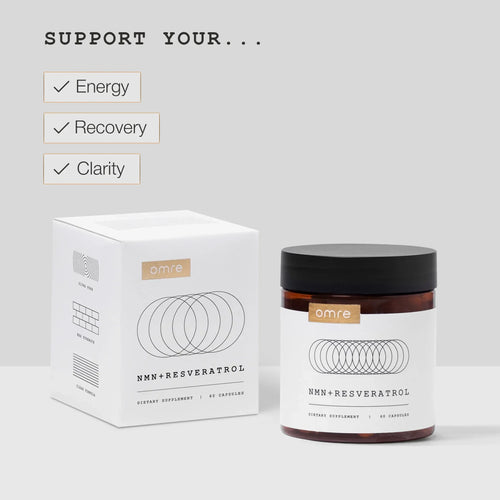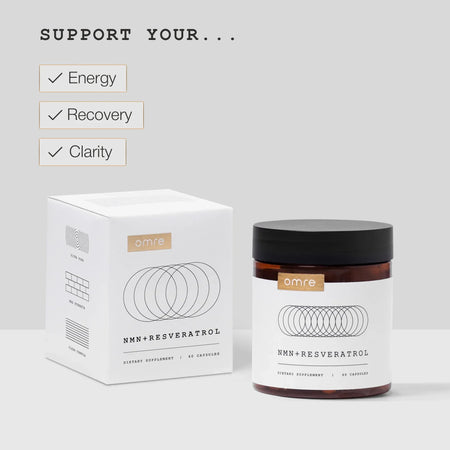Table of Contents
Alcohol consumption can have a profound effect on overall health, impacting almost every part of the body in some way. Some of its effects, such as cognitive impairment, high blood pressure, and liver damage, are quite well known.
However, alcohol’s effect on skin health—particularly in relation to aging—is often overlooked. And by missing this connection, you may run the risk of developing premature wrinkles, hyperpigmentation, rosacea, eczema, or worse.
So: how does alcohol age your skin? In this article, we’ll explore the various signs of aging alcohol can cause, the more serious skin issues it can lead to, and how you can reverse alcohol-related skin aging with diet and lifestyle changes. Read on to learn more.
NMN + RESVERATROL
Cellular NAD+ booster with ultra‑pure NMN and Resveratrol, at research‑backed doses.*
How Alcohol Affects Your Skin
Consuming alcohol can negatively affect the skin in many ways, both in the short-term and the long-term. For example:
Dehydration: Alcohol is a diuretic, which means that it stimulates urine production, leading to dehydration (1). As well as causing hangover symptoms, this loss of moisture makes the skin dry, dull, and older-looking, particularly in the case of frequent drinking.
Inflammation: Alcohol causes a bacterial toxin called lipopolysaccharide (LPS) to enter the bloodstream from the gut, triggering the immune system to respond with inflammation (2). In the short term, this inflammatory response causes redness, puffiness, and itchiness; in the long term, it can make the skin more sensitive and more prone to blemishes and scars.
Nutrient depletion: Alcohol also interferes with the body’s absorption of key nutrients such as vitamins A, C, and E, as well as glucose, amino acids, lipids, and more. Many of these nutrients are crucial for skin health, and prolonged insufficient levels of them can prevent the skin from repairing damage (3).
Together, these ramifications can lead to dramatic and distressing aging of the skin, making you look visibly older—as well as potentially contributing to more serious skin health issues later on.
Visible Signs of Alcohol-Induced Skin Aging
Anyone who drinks may experience some level of alcohol-induced skin aging, though it’s particularly noticeable in individuals who consume eight or more drinks per week (4). Here are some specific signs of facial aging that alcohol can cause.
Premature Wrinkles
One of the most obvious visible signs of excess alcohol consumption is premature wrinkling of the skin. This well-studied effect is the result of collagen breakdown.
Collagen is a kind of protein that the body produces which provides structure and strength to the skin; in this role, it is the most common protein in the body. Alcohol intake prevents skin fibroblasts from being able to produce type I collagen, resulting in gradual breakdown of the skin’s structure and impairment of its overall health (4).
These effects are particularly noticeable in the face. Heavy alcohol use is associated with increased upper facial wrinkling, oral commissures—vertical lines on either side of the mouth—and crows feet.
Dullness and Uneven Skin Tone
A well-known short-term effect of alcohol is that it dehydrates the body. When the skin is dehydrated, it loses its natural ‘youthful’ glow, appearing dull, ashen, and flat—and therefore older. In the long-term, exceeding recommended alcohol limits can lead to alcohol-induced liver damage, which (among many other symptoms) can also cause gray, dull, or discolored skin.
Chronic alcohol intake is also associated with hyperpigmentation. Hyperpigmentation, which causes uneven darkening of patches of the skin, is a common sign of aging; however, it can also be a symptom of alcohol-related complications like inflammation and impaired melanin function. Research indicates that generalized hyperpigmentation significantly correlates with the duration and quantity of alcohol intake (5).
Enlarged Pores and Acne
Alcohol also affects the production of sebum—a natural oily substance that protects and moisturizes the skin. As alcohol is a strong trigger for lipogenesis (fat synthesis), overconsumption can result in excess sebum production. This can cause oily skin, clogged pores, and acne breakouts, which are shown to be more prevalent among heavy drinkers (6).
Over time, acne can result in scarring, hyperpigmentation, and larger-looking pores, all of which contribute to the general appearance of skin damage and aging.
Broken Capillaries
Finally, alcohol consumption can affect the cardiovascular system. In the skin, this appears first as flushed cheeks, but also over time as broken capillaries—better known as spider veins.
Spider veins occur due to increased microvascular permeability, which refers to the ability of small blood vessels to allow substances to pass through their walls. When alcohol is consumed, this permeability increases, leading to more fluids and immune cells escaping into surrounding tissues. Repeated episodes of capillary dilation and increased permeability can weaken the blood vessel walls, making these effects more pronounced and leading to the appearance of broken capillaries (7).
Long-Term Effects of Alcohol on Skin Health
As well as making your skin appear visibly older, long-term alcohol consumption may also increase your chances of developing more serious skin health issues, from dermatitis to cancer.
Increased Risk of Skin Conditions
Research has shown that alcohol consumption is linked with a higher probability of developing certain skin conditions, such as:
Psoriasis: a complex and chronic disease in which the immune system attacks healthy skin cells, resulting in red, itchy, scaly patches of skin. Studies demonstrate a higher incidence of psoriasis in people who drink than people who don’t, though it’s not yet clear why (8).
Eczema: another skin condition associated with dry, itchy, bumpy skin. Eczema can have many potential causes, such as genetics, allergens, and environmental factors—but it occurs more frequently in people who drink. Discoid eczema, in particular, is strongly linked to excess alcohol consumption and impaired liver function (9).
Rosacea: a condition that primarily affects the face, causing redness, visible blood vessels, and acne-like bumps. While can be caused by a combination of genetic and environmental factors, alcohol misuse may bring it on or make it worse (9).
Not only are they more prevalent, but skin conditions such as psoriasis are also more resistant to treatment in individuals with alcohol misuse issues (9).
Compromised Skin Barrier Function
The skin is an essential protective layer for the body, but alcohol consumption makes it less able to perform in this important role. It does this in several ways:
Dehydration of the skin cells: Alcohol is a diuretic, leading to increased fluid loss from the body, including the skin.
Excess sebum production: In response to dehydration, the skin may produce more sebum to compensate.
Alteration of the skin’s pH balance: Alcohol can disrupt the natural pH balance of the skin, making it more alkaline. This shift can promote the growth of harmful bacteria.
These factors can all compromise the function of the skin’s natural barrier, resulting in a higher risk of infection and irritation. Dermatitis, for example, is the generic name for skin issues caused by irritants; because of these factors, and inhibition of the body’s immune system, these become more common in those who drink (7).
Accelerated Photoaging
Alcohol consumption makes the skin more vulnerable to UV damage, leading to accelerated photoaging (aging caused by sun exposure). This is because alcohol reduces the concentration of antioxidants in the skin (10).
Photoaging causes the premature appearance of visible aging signs, including wrinkles and hyperpigmentation. More importantly, however, it can increase your risk of developing skin cancer. A large study involving 14,037 skin cancer cases revealed that alcohol intake is linearly associated with an increased risk of skin cancer, particularly squamous cell carcinoma and basal cell carcinoma (11).
NMN + RESVERATROL
Cellular NAD+ booster with ultra‑pure NMN and Resveratrol, at research‑backed doses.*
How Different Types of Alcohol Affect Your Skin
Drinking any kind of alcoholic beverage can impact your skin’s health and appearance, so it’s not possible to avoid skin issues simply by switching your drink of choice. However, different kinds of alcohol can affect the skin in different ways.
Wine
Wine contains resveratrol: a powerful naturally-occurring antioxidant that has various potential health benefits, including remarkable anti-aging properties (12). However, despite this, the alcohol present in wine still ages and damages the skin, similar to any other alcoholic beverage. Additionally, wine contains sulfites, which can cause skin reactions such as rashes, hives, redness, and swelling in sensitive individuals (13).
Fortunately, it’s possible to enjoy the benefits of resveratrol without drinking alcohol by taking anti-aging NMN and resveratrol supplements.
Beer
Some types of beer can be higher in salt than other alcoholic drinks, which can exacerbate its dehydrating and skin-drying effects. Beer also contains plant estrogens, such as daidzein and genistein, which may have biological effects, including on skin health (14). Some of these effects may be positive (15), but more research is needed to fully understand them—and, of course, the alcohol in beer can still lead to general skin issues.
Spirits
Spirits are higher in alcohol content, and more alcohol causes more of the issues described above: inflammation, loss of moisture, increased sebum production, and increased incidence of skin conditions like psoriasis. Spirit mixers are also often high in sugars, potentially further contributing to skin issues like inflammation.
All in all, rather than changing the kind of alcohol you consume, the best way to avoid alcohol-related skin damage is to stop or limit your drinking.
Reversing Alcohol-Induced Skin Damage
Fortunately, with proper hydration, nutrition, and lifestyle adjustments, it’s possible to reverse some of the skin-damaging and aging effects of alcohol consumption.
Hydration Strategies
Alcohol dehydrates the skin, and while long-term dehydration can have stubborn effects, you can rehydrate quickly after drinking alcohol with some simple strategies.
For example, if you replace alcohol with more hydrating drinks, like water, juice, or sports drinks with electrolytes, you should start to see improvement in your skin’s moisture levels almost immediately. Most people should aim to drink eight glasses of water a day.
Using hydrating skincare products containing ingredients like hyaluronic acid or glycerin can help, too, by attracting and retaining moisture to make skin smoother and firmer.
Nutrient-Rich Diet
Foods high in nutrients, especially vitamins C, E, and A, can help nourish the skin and encourage it to heal, reducing alcohol-induced dryness and inflammation. Consider including more of the following foods in your diet:
Fruits and vegetables rich in micronutrients (vitamins and minerals)
Nuts, seeds, and fatty fish for omega-3 fatty acids
Berries and green tea which are often high in antioxidants
Whole grains like brown rice and quinoa that help reduce inflammation
Adding longevity supplements to your diet can further support skin health and recovery from alcohol-induced damage. A spermidine supplement, for example, may help boost the body’s natural process of removing and replacing damaged cells.
Skincare Routine Adjustments
Improving your skincare routine could also make a big difference in reversing the aging effects of alcohol. It’s important to choose a cleanser that has good oil control without being too harsh or drying. Moisturizing your skin can also help by sealing in moisture, restoring the skin’s natural barrier, and reducing the appearance of fine lines.
Cleansers and moisturizers containing antioxidants are particularly well known for their anti-aging properties. Retinoids, for example, can improve the thickness and color of the skin, limit sebum production, reduce water loss, stimulate elastin and collagen production, protect collagen from damage, influence the function of melanocytes, and reduce wrinkling (16).
Lifestyle Changes
Last but not least, there are several lifestyle changes you can make to help de-age your skin. Drinking less alcohol is, of course, crucial. While the worst of its effects on the skin occur due to excessive consumption, any drinking is bad for the skin—so, for best results, avoid alcohol entirely if possible.
Prioritizing sleep will also benefit your skin. Sleep plays an important role in hydration, blood circulation, tissue repair, collagen production, and hormonal balance, so aim to get 7-9 hours of high-quality sleep each night. Also, try your best to manage stress, for example by practicing mindfulness and relaxation techniques: like alcohol, stress hormones can age the skin prematurely.
Conclusion
In summary, alcohol can have many negative effects on the skin, such as dehydration, inflammation, and nutrient depletion. These can lead to various signs of premature skin aging, from wrinkles to hyperpigmentation, and can even increase your risk of developing more serious skin conditions.
Fortunately, however, making simple changes to your diet and skincare routine—as well as cutting out alcohol—can help to prevent and reverse this damage, as well as improving your skin health overall.
FAQs
How quickly can alcohol affect skin appearance?
Alcohol can impact skin appearance almost immediately, resulting in dryness, dullness, and puffiness, particularly after heavy drinking. The effect is cumulative, so these effects can worsen the more you drink.
Is there a safe amount of alcohol for skin health?
While moderation is important, drinking any amount of alcohol can contribute to skin damage and accelerated aging. To promote good skin health, limit your intake to the recommended guidelines, or ideally abstain entirely.
Can certain alcoholic drinks be less damaging to the skin?
Yes, although the alcohol in the drink will still have negative effects on the skin. Resveratrol (present in wine) is good for the skin, for example, but the alcohol content still causes the same damage as the alcohol in beer or spirits. Drinks with lower alcohol and sugar content are better if you are going to drink.
How long does it take for skin to recover after quitting alcohol?
Skin recovery can begin within days of quitting alcohol, once it has completely left your system. Over weeks and months, the skin can become visibly healthier, particularly if you stay hydrated and follow a skin-friendly diet and skincare routine.
Are there any skincare products that can counteract alcohol's effects?
Skincare products containing antioxidants, like retinoids and retinol, can help to combat many of the specific negative effects alcohol has on the skin. Taking longevity supplements like spermidine can also help with anti-aging.





